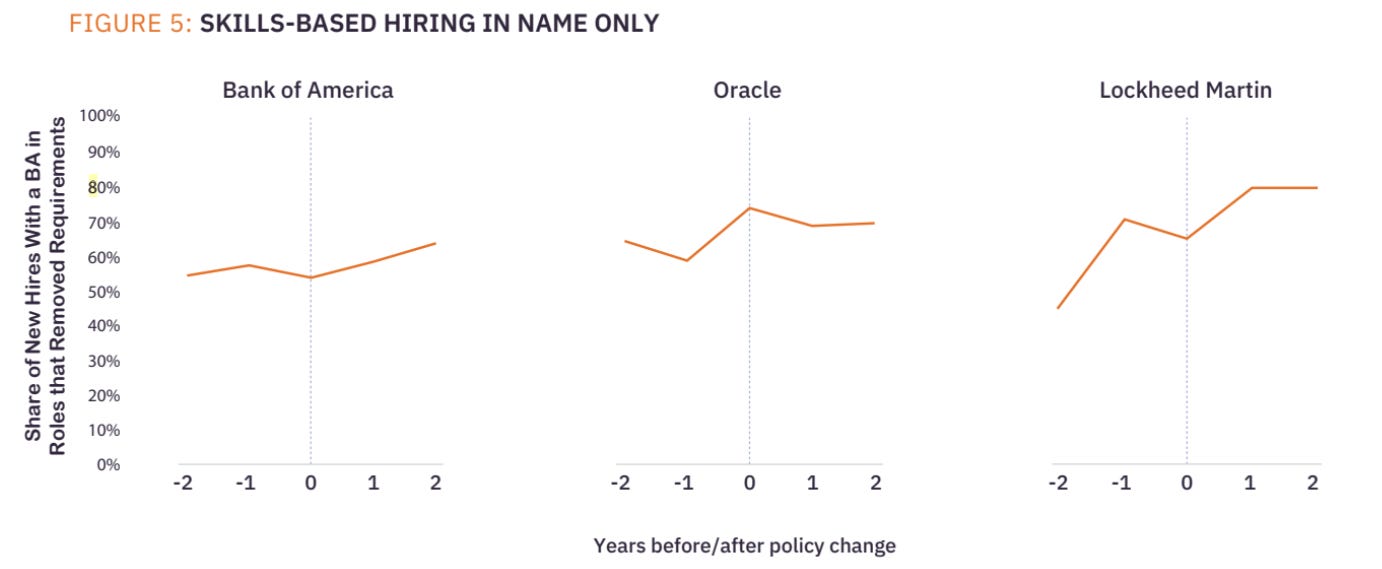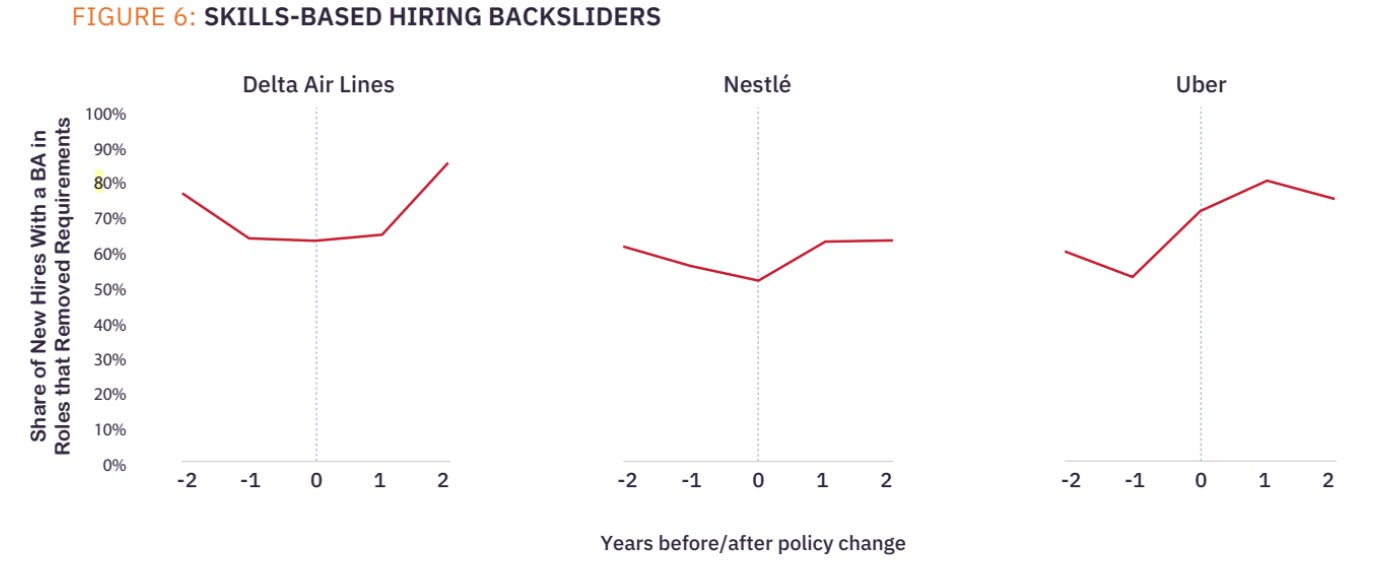Skills-Based Hiring: Promise vs. Reality
Despite growing popularity, skills-based hiring has yet to significantly increase opportunities for non-degreed workers, according to new research.
In recent years, skills-based hiring has emerged as a promising solution to the growing challenge of degree inflation and the need for a more diverse, inclusive workforce. By focusing on a candidate's demonstrable skills and experiences rather than relying solely on academic credentials, this approach has the potential to open up opportunities for workers who don't hold a college degree.
The idea is simple yet powerful: if a candidate has the skills to do the job, why should a lack of a degree stand in their way? Removing degree requirements from job postings and adopting skills-based hiring practices is seen as a way to tap into a larger talent pool, increase diversity, and provide a more level playing field for all job seekers.
As more and more employers, from major corporations to government agencies, publicly embrace skills-based hiring, it's easy to get caught up in the excitement and assume that meaningful change is just around the corner.
However, if you dig a bit deeper into the study from The Burning Glass Institute and Harvard Business School, you'll see it's not as straightforward as it seems. While the intentions behind this shift are admirable, the reality is that skills-based hiring has yet to live up to its full potential in terms of increasing access and opportunity for non-degreed workers.
The Rise of Degree Inflation
To understand the significance of skills-based hiring, it's important to first examine the historical context that has made it such a pressing issue. Over the past several decades, the United States has seen a dramatic increase in the number of people earning college degrees. In 1960, just 8% of Americans held a bachelor's degree; by 2022, that number had risen to an impressive 38%.
While this growth in educational attainment has undoubtedly benefited countless individuals and the nation as a whole, it has also had an unintended consequence: degree inflation. As the pool of college-educated workers has grown, many employers have begun requiring degrees for jobs that previously didn't demand them, even when the actual skills and tasks required for the role haven't changed.
This phenomenon has had a profound impact on both workers with degrees and those without. For college graduates, degree inflation has meant that the jobs their parents or grandparents might have been able to secure without a degree now require one, leaving many stuck in roles that don't fully utilize their skills or education. Meanwhile, workers without degrees have found themselves increasingly shut out of the kinds of jobs that were once stepping stones to upward mobility.
The result is a labor market where degrees have become a proxy for skills and aptitude, rather than a reflection of the actual demands of the job. This has created a frustrating catch-22 for many workers: they need experience to get a job, but they can't get a job without a degree, even if they have the necessary skills.
It's against this backdrop that skills-based hiring has emerged as a potential solution. By shifting the focus away from degrees and towards the actual skills and competencies required for success in a given role, employers have an opportunity to tap into a broader, more diverse talent pool while also ensuring that they're hiring the best person for the job, regardless of their educational background.
Employers Embracing Skills-Based Hiring
In response to the challenges posed by degree inflation and a tight labor market, a growing number of employers have begun to embrace skills-based hiring.
This shift has been driven by a variety of factors, including the increasing demand for digital skills across a wide range of industries, the recognition of the value of alternative learning pathways, and a growing understanding of the specific competencies required for success in today's rapidly evolving job market.
One of the most visible signs of this shift has been the wave of high-profile companies and government agencies publicly announcing that they are removing degree requirements from many of their job postings.
From tech giants like Apple and Google to major retailers like Walmart and Costco, employers across a wide range of industries have made headlines with their commitment to skills-based hiring.
The Reality: Limited Progress
However, while the growing embrace of skills-based hiring is certainly encouraging, a closer look at the data reveals that the reality on the ground has not yet caught up with the rhetoric. Despite the many high-profile announcements and commitments to skills-based hiring, the actual impact on hiring practices has been limited.
According to a recent analysis by the Burning Glass Institute, only about 3.6% of job postings have actually removed degree requirements in recent years. While this represents a significant increase from previous years, it's still a relatively small fraction of the overall job market.
Moreover, even among the roles that have dropped degree requirements, the impact on actual hiring has been mixed. On average, companies that removed degree requirements saw only a modest 3.5 percentage point increase in the share of non-degreed workers hired into those roles.
There are a few potential explanations for this limited progress. One is that even when degree requirements are removed from job postings, many employers may still be relying on degrees as a proxy for skills and experience during the hiring process. Old habits die hard, and it takes time and effort to truly shift an organization's culture and practices around hiring.
Another factor may be the challenges involved in accurately assessing skills and competencies, particularly for non-degreed candidates. While there are a growing number of tools and platforms designed to help employers evaluate candidates based on their actual skills, many organizations may still be struggling to implement these approaches effectively.
Despite these challenges, however, it's important to recognize that even incremental progress toward skills-based hiring can have a meaningful impact on individual workers and the broader labor market. Every non-degreed candidate who gets hired into a role that previously required a degree represents a small but significant victory for inclusion and opportunity.
Three Types of Employers
As the skills-based hiring movement has gained momentum, it's become clear that not all employers are approaching this shift in the same way. According to the Burning Glass Institute analysis, companies that have embraced skills-based hiring can be broadly categorized into three groups:
1. Skills-Based Hiring Leaders
These employers, which make up about 37% of the companies studied, are making real, sustained changes to their hiring practices. On average, these companies have increased the share of non-degreed workers hired into roles that previously required a degree by 18%. This group includes a diverse range of employers, from major corporations like Walmart and Apple to government agencies like the State of Minnesota.
2. In Name Only
The largest group of employers, comprising about 45% of the sample, have publicly removed degree requirements from job postings but have made little to no change in their actual hiring practices. Many of these companies continue to hire the same share of degreed candidates into roles that no longer require degrees, suggesting that their commitment to skills-based hiring may be more rhetorical than practical.
3. Backsliders
The final group, which makes up about 18% of the sample, have removed degree requirements and made initial progress in hiring non-degreed workers, only to revert to their old hiring patterns over time. This suggests that while these companies may have had good intentions, they struggled to make lasting changes to their hiring practices.
These findings underscore the fact that truly embracing skills-based hiring requires more than just removing degree requirements from job postings. It requires a sustained commitment to changing the way companies evaluate and hire candidates, from the initial screening process to the final selection.
The Benefits of Skills-Based Hiring Done Right
When done effectively, however, skills-based hiring can have significant benefits for both workers and employers. For non-degreed workers who are hired into roles that previously required a degree, the impact can be life-changing.
According to the Burning Glass Institute analysis, these workers see an average salary increase of 25%, or about $12,400 per year.
But the benefits aren't just limited to workers. Employers who have successfully implemented skills-based hiring have also seen significant gains in terms of employee retention and performance. The same analysis found that non-degreed workers hired into roles that previously required degrees had a 10 percentage point higher retention rate compared to their degreed counterparts, a difference of about 20%.
These findings suggest that by opening up opportunities to a broader, more diverse pool of candidates, skills-based hiring can help employers find talented, dedicated workers who might have been overlooked in a more traditional hiring process. And by focusing on actual skills and competencies rather than just degrees, employers can ensure that they are hiring the best person for the job, regardless of their educational background.
Of course, realizing these benefits requires a real commitment to skills-based hiring, not just a rhetorical one. Employers need to invest in the tools and processes necessary to accurately assess candidates' skills and competencies, and they need to be willing to challenge long-held assumptions about what makes a candidate qualified for a particular role.
But for those employers who are willing to put in the work, the payoff can be significant. By embracing skills-based hiring, they can tap into a broader, more diverse talent pool, improve retention and performance, and create more equitable, inclusive workplaces.
Identifying Roles Ripe for Skills-Based Hiring
While skills-based hiring has the potential to transform the labor market as a whole, some roles are better positioned for this shift than others. According to the Burning Glass Institute analysis, the occupations that are most ripe for skills-based hiring are those where there is a significant mismatch between the skills employers are seeking and the educational attainment of the current workforce.
These roles typically have a lower barrier to entry in terms of formal education, but still require a specific set of skills that can be acquired through alternative learning pathways such as apprenticeships, bootcamps, or on-the-job training.
Some examples of these roles include:
Construction managers: 39% of job postings for this role currently require a degree, despite the fact that many construction managers have gained their skills through hands-on experience and industry-specific certifications.
Web developers: 52% of job postings for web developers require a degree, even though many successful developers have learned their skills through coding bootcamps, online courses, or self-directed learning.
Sales representatives: While many sales roles have traditionally required a degree, the key skills for success in sales - such as communication, relationship-building, and problem-solving - can be developed through a variety of non-degree pathways.
By identifying roles like these where skills-based hiring could have a significant impact, employers can target their efforts and make meaningful progress towards creating more inclusive, diverse workplaces.
Skills-Based Hiring
The skills-based hiring movement has the potential to be a game-changer for the labor market, opening up opportunities for millions of talented, driven workers who have been overlooked or excluded by traditional hiring practices. By focusing on actual skills and competencies rather than just degrees and credentials, employers can tap into a broader, more diverse talent pool and build more equitable, inclusive workplaces.
But as the data shows, realizing this potential will require more than just rhetoric or token gestures. Employers need to make a real, sustained commitment to changing their hiring practices, investing in the tools and processes necessary to accurately assess candidates' skills, and challenging long-held assumptions about what makes someone qualified for a particular role.
The good news is that for those employers who are willing to put in the work, the benefits of skills-based hiring are clear. From higher retention rates to improved performance to increased diversity and inclusion, the companies that have successfully implemented skills-based hiring are reaping the rewards.
So while the road to a truly skills-based labor market may be long, the destination is worth the journey. By continuing to push for change, to challenge the status quo, and to champion the value of skills and competencies over degrees and credentials, we can create a more equitable, inclusive, and dynamic workforce that benefits everyone.
How to Implement Skills-Based Hiring in Your Company
If you're convinced of the benefits of skills-based hiring and ready to start making changes in your own organization, it can be difficult to know where to begin. Shifting to a skills-based approach isn't just about removing degree requirements from job postings; it requires a fundamental shift in the way your company thinks about talent and evaluates candidates.
Here are some key steps you can take to start implementing skills-based hiring in your company:






